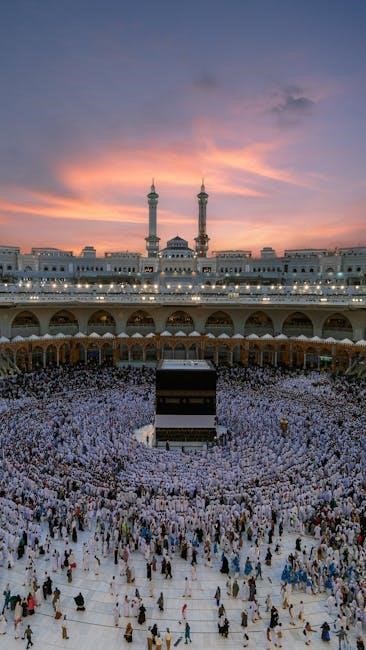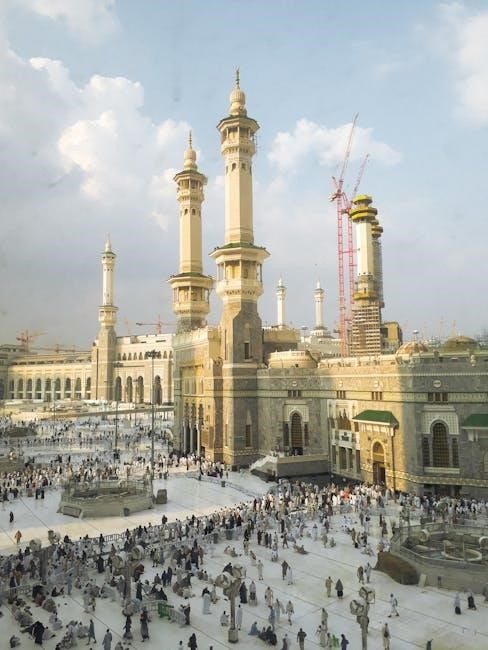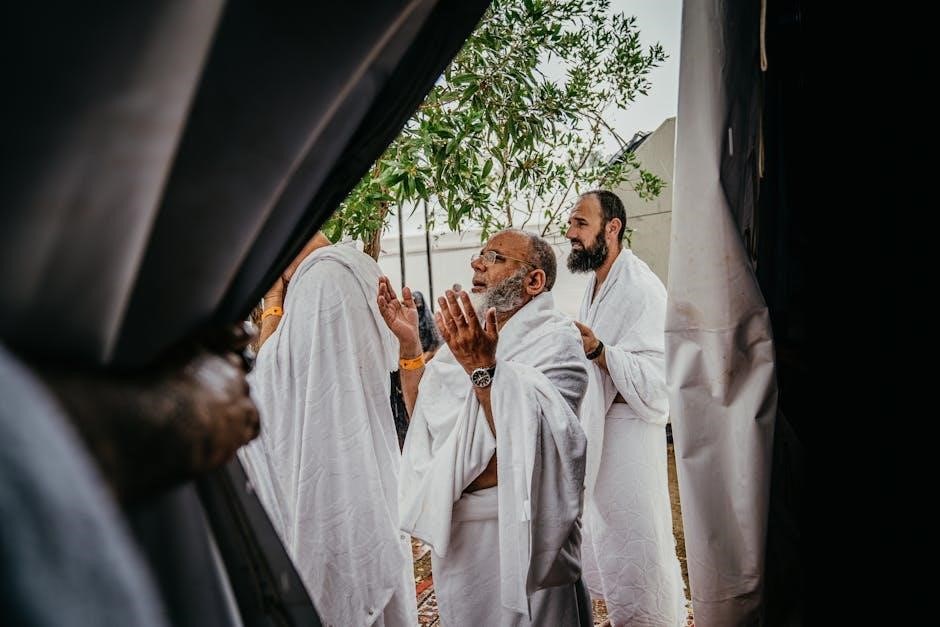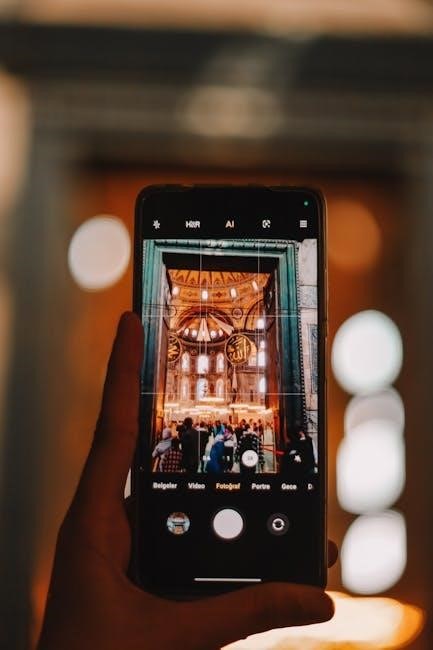Umrah, a sacred Islamic pilgrimage, is a journey of spiritual growth and devotion. It involves rituals like Ihram, Tawaf, and Sa’i, performed with sincerity and adherence to Sunnah.
Understanding the Significance of Umrah
Umrah, often referred to as the “minor pilgrimage,” holds profound spiritual significance in Islam. It is a Sunnah of the Prophet Muhammad (saw) and serves as a means of seeking Allah’s forgiveness, cleansing the soul, and strengthening one’s faith. Umrah fosters a deep connection with Allah, allowing pilgrims to reflect on their lives and rejuvenate their spiritual selves. It is a demonstration of devotion, unity, and humility among Muslims worldwide. Performing Umrah is not just a ritual but a journey toward self-purification and divine mercy, emphasizing the importance of sincerity and adherence to Islamic teachings.
Preparation for Umrah: A Spiritual and Physical Journey
Preparation for Umrah is a holistic process that combines spiritual readiness with physical arrangements. Spiritually, one must intend to seek Allah’s pleasure, recite supplications, and adopt a mindset of humility. Physically, pilgrims should ensure they are in good health, complete necessary grooming (like trimming nails and removing unwanted hair), and perform ablution before donning Ihram. It is essential to familiarize oneself with the rituals and prohibitions during Ihram, such as avoiding perfumes and hunting. Pilgrims must also secure their travel arrangements and documents. This dual preparation ensures a smooth and meaningful experience, aligning with the Sunnah and the teachings of Islam.
Step-by-Step Guide to Performing Umrah

Umrah involves four key steps: entering Ihram, performing Tawaf around the Kaaba, running between Safa and Marwa, and shaving or trimming hair. These rituals, done in sequence, complete the pilgrimage.
Entering the State of Ihram: The First Pillar of Umrah

Entering the state of Ihram is the first and most crucial step of Umrah. It signifies a pilgrim’s commitment to the rituals and their submission to Allah. Ihram begins at one of the designated Meeqat points, where pilgrims don simple, unsewn clothing, known as Ihram garments, and perform a ghusl (ritual bath) and wudhu (ablution). Men wear a white, two-piece garment, while women may wear their usual modest attire. The pilgrim then declares their intention to perform Umrah with the Talbiyah invocation, expressing their readiness to respond to Allah’s call. This act marks the official start of the Umrah journey.
Performing Tawaf: The Ritual of Circumambulation
Performing Tawaf, the ritual of circumambulation, is a central pillar of Umrah. It involves walking seven times around the Kaaba in a counterclockwise direction, starting from the Black Stone. Pilgrims maintain a state of purity, facing the Kaaba throughout. The first three circuits are performed at a brisk pace, symbolizing the Prophet Muhammad’s (PBUH) urgency to worship. The remaining four are done calmly, reflecting deep devotion. During Tawaf, pilgrims recite supplications, express gratitude, and seek forgiveness. Kissing or touching the Black Stone at the start and end of each circuit is a cherished act, though not mandatory. Tawaf embodies submission and unity with fellow worshippers. Upon completing seven circuits, pilgrims drink Zamzam water and proceed to the next ritual, Sa’i.

Completing Sa’i: The Ritual of Running Between Safa and Marwa
Sa’i, meaning “to strive,” is a significant ritual in Umrah, symbolizing Hagar’s search for water for her son Ishmael. Pilgrims run or walk briskly between Safa and Marwa seven times, starting at Safa and ending at Marwa. Men are encouraged to run between the green markers, while women walk at a steady pace. The ritual reflects trust in Allah’s provision and emulates Hagar’s faith. Upon reaching Marwa, pilgrims complete their rounds, symbolizing fulfillment and divine mercy. Sa’i is a physical and spiritual exertion, deepening the connection with Allah and commemorating the divine intervention in Hagar’s life. This act strengthens patience and gratitude.
Shaving or Trimming Hair: The Final Act of Umrah
The final act of Umrah is shaving or trimming hair, symbolizing the completion of the pilgrimage and the pilgrim’s return to their normal state. Men are required to shave their heads completely, while women trim their hair, typically by cutting a small portion from the ends. This act, known as Halq or Taqeer, must be performed after completing Sa’i. It signifies spiritual renewal and equality among pilgrims. Pilgrims often recite a supplication expressing gratitude to Allah for enabling them to complete Umrah. This act marks the end of the Ihram state, allowing pilgrims to resume normal activities. It embodies humility and devotion to Allah.
Essential Supplications and Dua’s for Umrah
Key supplications include the Talbiyah, recited during Ihram, and the final dua after completing Umrah. These prayers express devotion, gratitude, and seeking forgiveness, ensuring a spiritually fulfilling experience.
Reciting Talbiyah: The Invocation of Response to Allah’s Call
Talbiyah is a sacred invocation recited during Umrah, expressing obedience to Allah’s call. Men recite it loudly, while women recite it softly. The words, “Here I am, O Allah, here I am,” signify readiness to respond to Allah’s command. Recited after donning Ihram, it is repeated during Tawaf and Sa’i, reinforcing spiritual focus. The Talbiyah embodies devotion, humility, and surrender, connecting pilgrims to Allah’s divine presence. Its repetition throughout Umrah deepens the pilgrim’s mindfulness of their sacred journey and intention to seek spiritual purification and forgiveness. This act is a cornerstone of Umrah, reflecting Islamic teachings on submission and faith.

Dua’s During Tawaf and Sa’i: Maximizing Spiritual Benefits
Dua’s during Tawaf and Sa’i are integral to maximizing the spiritual benefits of Umrah. Pilgrims are encouraged to recite specific supplications, seeking forgiveness, guidance, and Jannah. During Tawaf, du’as like “Rabbana atina fid-dunya hasanatan wa fil akhirati hasanatan” are recommended. At the Black Stone, pilgrims pray for sins to be forgiven. During Sa’i, supplications at Safa and Marwa, such as “Inna as-Safa wal-Marwata min sha’a’irillah,” reinforce faith and devotion. These du’as, rooted in Sunnah, deepen the pilgrim’s connection to Allah, emphasizing humility and gratitude. Reciting them with sincerity enhances the spiritual experience, making the rituals more meaningful and rewarding.

Important Considerations and Prohibitions During Umrah
During Umrah, pilgrims must avoid prohibited acts like hunting, using scents, and harming others. Adhering to Sunnah and maintaining ritual purity ensures a sincere and valid pilgrimage experience.
Understanding Meeqat Boundaries and Their Significance
Meeqat boundaries are designated points established by the Prophet Muhammad (saw) beyond which pilgrims must enter the state of Ihram. These points ensure pilgrims prepare spiritually and physically before approaching Makkah. Key Meeqat points include Dhul Hulaifah, Al-Juhfah, Qarn al-Manazil, and Yalamlam. Pilgrims must not cross these boundaries without Ihram, emphasizing the sacredness of the journey. Adhering to Meeqat rules is crucial for the validity of Umrah, reflecting obedience to Islamic teachings and respect for the pilgrimage’s sanctity. These boundaries serve as a reminder of the transition from worldly life to a state of devotion and worship.
Prohibited Acts During Ihram: Maintaining Ritual Purity
During Ihram, certain acts are prohibited to maintain ritual purity and focus on worship. These include hunting or assisting in hunting, using scented products, wearing perfumed oils, and engaging in marital relations. Additionally, pilgrims must avoid killing animals, even insects, and refrain from cutting nails or shaving. Men are prohibited from covering their heads or wearing stitched clothing. Women must avoid face veils and gloves. Adhering to these rules ensures the sanctity of the pilgrimage and reflects a pilgrim’s commitment to spiritual devotion. These prohibitions emphasize the importance of humility and submission to Allah during the sacred journey of Umrah.

The Benefits and Virtues of Performing Umrah
Umrah offers profound spiritual cleansing, forgiveness, and the removal of sins, as it strengthens one’s connection with Allah. It is a means of seeking divine mercy and blessings.
Spiritual Cleansing and Forgiveness: The Rewards of Umrah
Umrah is a powerful act of worship that offers immense spiritual cleansing and forgiveness. It provides an opportunity to seek Allah’s mercy, purifying the heart and soul. By performing Umrah with sincerity, pilgrims experience a profound sense of renewal, as if reborn free from sins. The rituals of Ihram, Tawaf, and Sa’i symbolize devotion and humility, drawing believers closer to Allah. The Prophet (saw) emphasized that Umrah removes sins and poverty, much like a bellows purifies iron. This sacred journey rejuvenates faith, offering a fresh start and a deeper connection with the Divine, fostering lasting spiritual growth and inner peace.

Strengthening Faith and Connection with Allah
Umrah is a profound spiritual journey that deepens one’s faith and strengthens the connection with Allah. By immersing in sacred rituals like Ihram, Tawaf, and Sa’i, pilgrims experience a heightened sense of devotion and humility. The act of reciting Talbiyah and performing these rituals with sincerity fosters a deeper relationship with Allah, renewing one’s commitment to His will. Umrah provides a unique opportunity for self-reflection, allowing believers to reconnect with their faith and seek divine guidance. This spiritual rejuvenation empowers individuals to return home with a stronger, more personal connection to Allah, enriching their lives with renewed purpose and devotion.
Umrah is a profound spiritual journey, cleansing the soul, strengthening faith, and fostering a deeper connection with Allah, leaving pilgrims with cherished memories and divine blessings.

Reflecting on the Umrah Experience: A Lifetime Memory
Performing Umrah is a transformative experience, etched in memory as a testament of devotion. Pilgrims reflect on moments of profound spirituality, from the Ihram’s purity to the Tawaf’s unity. Each step, from Meeqat to the Kabah, resonates with divine connection. The rituals, intertwined with heartfelt supplications, create a journey of self-discovery and renewal. The camaraderie among pilgrims and the shared quest for blessings amplify the experience. Returning home, many carry a renewed sense of purpose, gratitude, and closeness to Allah, cherishing the memories of this sacred journey as a lifetime treasure.




